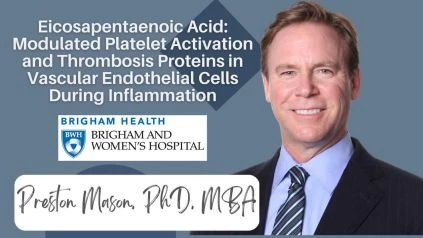Eicosapentaenoic Acid: Modulated Platelet Activation and Thrombosis Proteins in Vascular Endothelial Cells During Inf...
Preston Mason, PhD, MBA discusses Eicosapentaenoic Acid: Modulated Platelet Activation and Thrombosis Proteins in Vascular Endothelial Cells During Inflammation
Eicosapentaenoic Acid: Modulated Platelet Activation and Thrombosis Proteins in Vascular Endothelial Cells During Inflammation Preston Mason PhD
By Preston Mason, PhD, MBA
Hello, my name is Preston Mason, and I'm here to discuss research. I recently presented at the American College of Cardiology in New Orleans. The title of my presentation that was given there is Eicosapentaenoic Acid or EPA modulates the expression or proteins linked to platelet activation and thrombosis in vascular endothelial cells during inflammation. My co-investigators are Sam Sherratt, Peter Libby, and Deepak Bhatt. They're from, in the case of myself, from Brigham and Women's Hospital and affiliated with Harvard Medical School and Deepak Bott is with Mount Sinai, in New York. So the objective of our study was to evaluate the effect of inflammation on the expression of proteins in human endothelial cells. This was an in vitro laboratory study, so we had very well controlled conditions to study the effects of inflammation on these cells. We then wanted to see what effect EPA, which is an omega-3 fatty acid had on the expression of these protein. Now just as way of background, we all know that platelet activation is essential to thrombus formation during atherosclerosis. So anything that promotes, platelet activation such as inflammatory stimuli like angiotensin II and cytokines like IL-6, they'll trigger that condition leading to thrombus formation and ischemic events. So the healthy endothelium preserves not only normal vasodilation, but interferes with platelet activation and thrombus formation by releasing a variety of proteins and signaling molecules, such as nitric oxide. One of the more important proteins that it releases, it's called tissue factor pathway inhibitor, or TFPI, that in particular is important in inhibiting early phases of the procoagulant process. Now by way of background also Eicosapentaenoic Acid is a highly purified form of EPA.
So this formulation of this particular omega-3 fatty acid has been associated with reduced risk in large clinical outcome trials, such as REDUCE-IT trial in the REDUCE-IT trial high-risk patients, or randomized at the to placebo or to Icosapent Ethyl and followed over almost 5 years and over 8,000 patients. And during that time, there was a 25% relative risk reduction among those patients randomized to Icosapent Ethyl, this was a composite or mace of cardiovascular events. And in addition, there was a 31% relative risk reduction in ischemic events including stroke, MI, and cardiac death. So this was very successful in terms of showing a signal for having a anti-ischemic benefit, but the mechanism is not fully understood. There in general, we know that omega-3 fatty acids and EPA in particular may have an anti-thrombotic event, but the specific mechanisms are not well understood. So that was the purpose of this study is to specifically look at how EPA modulates expression of proteins from endothelial cells given their central role in regulating both platelets and thrombus formation.
The way we measured protein expression was using, advanced mass spectroscopy that enables us to measure the expression of hundreds of proteins simultaneously taking advantage of their unique molecular weight. And under conditions of inflammation triggered by either angiotensin II or IL-6, we measured the effect of EPA on expression. And what we saw was hundreds of proteins significantly modulated by at least a hundred, full a hundred percent or twofold. And those are the proteins we focused on, and I'd like to just share a few of them that are particularly of interest. One protein that was upregulated specifically by EPA was TFPI or tissue factor pathway inhibitor. So that was an important finding of, the ability of EPA to stimulate the production of this agent that interferes with thrombus formation under conditions of inflammation, particularly with an angiotensin II. We also saw an increase in expression of thrombospondin 1 also interferes with thrombus formation, and we saw decrease expression in proteins that promote platelet activation, including CD109 and Thbs1. So we saw both increase in decreases in expression of proteins that modulate favorably thrombosis in the presence of EPA.
In conclusion, EPA affected expression of proteins involved in platelet activation and thrombosis under inflammatory conditions, including in increased levels of tissue factor platelet in, tissue factor pathway inhibitor, or TFPI. And other proteins that modulate thrombosis. These findings represent a potential antithrombotic mechanism for EPA that may contribute to reduce ischemic events beyond the ability of EPA to lower triglycerides. So in further studies, we'll be moving into in-vivo models of atherosclerosis and then further characterizing these important anti-platelet and antithrombotic properties of EPA. Now, what are potential downsides? Well, anything that interferes with platelet activation and thrombosis may lead to increased bleeding and in REDUCE-IT. There was a small but significant increase in bleeding among patients randomized to IPE, but there was no fatal bleeding, and again, the clinical benefits were very impressive, including, like I said, a more than 30% reduction in ischemic events and cardiac death. So in light of that, we believe this could represent a novel benefit of EPA to help explain its benefit in clinical outcome trials. Thank you very much.
What is Eicosapentaenoic Acid and how is it used in Cardiology?
Eicosapentaenoic Acid (EPA) is an omega-3 fatty acid found in fish oil. It is a type of polyunsaturated fatty acid that is essential for human health but cannot be synthesized by the body and must be obtained from the diet or supplements.
In cardiology, EPA has been shown to have a number of beneficial effects, including:
-
Lowering triglyceride levels: EPA has been shown to lower triglyceride levels, which are a type of fat found in the blood that can increase the risk of heart disease.
-
Reducing inflammation: EPA has anti-inflammatory effects, which can help reduce the inflammation that can contribute to the development of heart disease.
-
Improving endothelial function: EPA can improve the function of the endothelium, the layer of cells that lines the inside of blood vessels, which can help improve blood flow and reduce the risk of cardiovascular events.
-
Decreasing platelet aggregation: EPA has been shown to decrease platelet aggregation, which can help reduce the risk of blood clots that can lead to heart attacks and strokes.
-
Lowering blood pressure: EPA may help lower blood pressure, which is a major risk factor for heart disease.
As a result of these effects, EPA is often used in the treatment of cardiovascular disease, particularly in patients with high triglyceride levels or those at high risk of cardiovascular events. It is available as a dietary supplement and is also found in prescription medications for the treatment of high triglycerides, such as icosapent ethyl.
10 Key Takeaways about the Eicosapentaenoic Acid REDUCE-IT Clinical Trial
-
Eicosapentaenoic acid (EPA) is a type of omega-3 fatty acid that is found in fish oil and has been shown to have anti-inflammatory properties.
-
Vascular endothelial cells play a key role in the development of thrombosis (blood clots) and are also involved in the inflammatory response.
-
Inflammation can cause changes in the expression of proteins in vascular endothelial cells that contribute to thrombosis.
-
EPA has been shown to modulate the expression of proteins in vascular endothelial cells that are linked to platelet activation and thrombosis.
-
Platelet activation is a key step in the formation of blood clots.
-
EPA has been shown to inhibit platelet activation by reducing the expression of proteins involved in platelet activation.
-
EPA has also been shown to reduce the expression of proteins involved in the coagulation cascade, which is another key step in the formation of blood clots.
-
EPA may have a protective effect against thrombosis by reducing platelet activation and the coagulation cascade.
-
The anti-inflammatory properties of EPA may also contribute to its protective effect against thrombosis.
-
These findings suggest that EPA may have potential as a therapeutic agent for the prevention and treatment of thrombotic disorders.
R. Preston Mason, PhD, MBA - About The Author, Credentials, and Affiliations
R. Preston Mason, PhD, MBA, is a renowned scientist and entrepreneur who has made significant contributions to the fields of biochemistry, cardiovascular disease, and translational medicine. He is currently an Associate Professor of Medicine at Harvard Medical School, where he leads a research laboratory focused on developing novel therapeutic approaches for cardiovascular disease.
Dr. Mason earned his Bachelor of Science degree in chemistry from Tuskegee University, followed by a PhD in biochemistry from Emory University. He then pursued an MBA from the Wharton School at the University of Pennsylvania, where he developed his business acumen and honed his skills as an entrepreneur.
Throughout his career, Dr. Mason has held various academic and industry positions, including serving as a faculty member at the University of Connecticut School of Pharmacy and as a senior scientist at Pfizer, Inc. He has also founded several companies, including Elucida Research, LLC, which develops drug delivery technologies for various therapeutic applications.
Dr. Mason's research has led to over 150 peer-reviewed publications and numerous patents. His work has been recognized with several awards, including the American Chemical Society's Heroes of Chemistry Award and the Black Engineer of the Year Award. He is also a Fellow of the American Heart Association.
In addition to his research and entrepreneurial pursuits, Dr. Mason is dedicated to mentoring the next generation of scientists and entrepreneurs. He has served as a mentor to numerous graduate students, postdoctoral fellows, and young professionals, and he is committed to promoting diversity and inclusion in science and entrepreneurship.
Overall, Dr. R. Preston Mason's interdisciplinary background and expertise have enabled him to make significant contributions to the fields of biochemistry and cardiovascular disease, while also serving as a role model and mentor for future generations of scientists and entrepreneurs.




